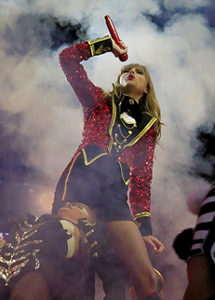By Eric Gasa
It’s a familiar story; the young artist entangled in a battle for their work against the record label executives. But even for a veteran pop star like Swift, the news is no less difficult and complicated.It takes a bit of work to get to the center of Taylor Swift’s debacle with former record label Big Machine, but at its heart is a poignant conversation about the record industry, executives, and the artists; and everyone is listening.
As the story goes, famed mega star agent, Scooter Braun, and his company Ithaca Recordings bought Swift’s old label, Big Machine, along with all six of the master recordings of her previous albums, for the hefty price tag of $300 million. On Sunday June 30, the day of the deal, Swift took things into her own hands via an open letter she posted to Tumblr.
“I learned about Scooter Braun’s purchase of my masters as it was announced to the world,” she writes, “All I could think about was the incessant, manipulative bullying I’ve received at his hands for years. This is my worst scenario.
”Braun, who has previously worked with Justin Bieber, Kanye West, and Arianna Grande, is a huge name in the industry and not a stranger to drama either.
But what exactly are master recordings and why are they so important? In short, master recordings refer to the original recording and master rights of an artist’s music. The owner of these rights owns the copyright, controls where the music is licensed, and can collect royalties. Whoever owns the label, legally owns the music.
Knowing how Swift removed her own music from Spotify in 2014, she certainly likes to keep control of her releases.
Swift’s criticisms did not end with Braun either. Swift later called out Big Machine founder, Scott Borchetta for signing the rights to her art away when she first joined the label when she was only 15, according to a source from Pitchfork.
Apparently, Swift’s only offer from Borchetta was to earn back recording rights for older records with each new one she put out. A bit of a sore deal honestly, six albums in the making.
Borchetta has since denied allegations and claiming that Swift “had every chance” to own her master recordings. Justin Bieber also responded to Swift, coming to Braun’s defense in a lengthy post on Instagram and called Swift a bully.
In the end, Taylor may have lost a chunk of her past with her departure from Big Machine, but she is hopeful for her new start with Universal Music Group and Republic Records which she signed with last year.
“Thankfully, I am now signed to a label that believes I should own anything I create,” Swift writes.Swift’s next record Lover is due out on August 23 via Republic Records.

